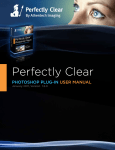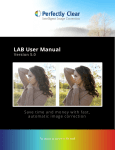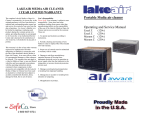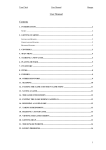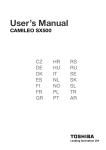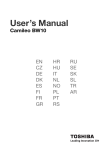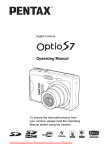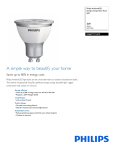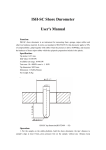Download read our User Manual
Transcript
PERFECTLY CLEAR PLUG-IN USER MANUAL Version 2.0 Per f ec t your p hot os w ith jus t 1 c lic k a nd s a ve c ountles s hour s of edi ting . For photos as vibrant as life itself Congratulations! You will soon be processing your photos through the World’s fastest and most advanced automatic image correction science available on this planet! Our mission is to save you significant time while producing outstanding quality. Automatically. Why Perfectly Clear? Perfection that’s tested over 30 million times a day – Every day over 30 million prints are automatically corrected and made amazing by Perfectly Clear, effortlessly. Image Correction down to a science – Over 12 years of R&D. 10 patented processes. 20 unique algorithms. That’s what it takes to develop award-winning technology. See the Proof Saving you time - Customers report 85% reduction in editing time and more than 300% reduction in real time to process images. Ready to start saving? Page 2 Inside This Manual Chapter 1 What’s new in version 2.0 Minimum System Requirements 4 Chapter 2 Installing & Activating 7 Chapter 3 Let’s start correcting! 16 Chapter 4 The Power of Presets 19 Chapter 5 Tweak: Fine Tuning Perfectly Clear 26 Chapter 6 Basic Workflow Photoshop Batch Processing with Actions Lightroom Workflow 41 Keyboard Shortcuts Page 3 Chapter 1 What’s new in Version 2.0 System Requirements Page 4 What’s new in Version 2.0 Version 2.0 provides a major update to all of our core processing technology, and also provides an easier to use, better looking interface. The major updates include Faster–re-engineered algorithms deliver at nearly 2x the speed Our Most Powerful auto correction yet - new algorithms New Noise engine removes noise even more accurately Next-generation Beautify gives you 10 ways to look your best Easier Access to Presets – Import and Export Presets to share your results with friends Overall Opacity Control – Makes it easy to “fade out” the Perfectly Clear effect to provide even more correction control 7. Many Workflow and Interface Improvements: a. Zoom to 100% - accurately judge fine detail when sharpening or removing noise b. Split View - more ways to visualize your corrections to ensure the best final product c. More keyboard control – “Z” to toggle zoom; CTRL +/- to zoom in or out, “Space” to toggle before / after view, “F” to toggle full screen view d. Import & Export Presets – to make it easy to get the exact same corrections on all the computers you use e. Check for Updates – to make sure you’re aware of all future updates and improvements f. New Presets Panel – to make selecting and applying your favorite Presets fast and easy 1. 2. 3. 4. 5. 6. Page 5 System Requirements • • • • • • • • • Mac OSX Mountain Lion (10.8) or newer (including Yosemite) Intel Processor PS Plugin: Photoshop CS3, CS4, CS5, CS6 or Creative Cloud (supports both 32 bit and 64 bit). Photoshop Elements 8,9,10,11, 12, 13 LR Plugin: Lightroom 2.7 or newer 4 GB RAM or more Windows 7, 8, and 10 (32-bit and 64-bit compatible) PS Plugin: Photoshop CS3, CS4, CS5, CS6 or Creative Cloud (supports both 32 bit and 64 bit). Photoshop Elements 8, 9, 10, 11 12, 13. Corel PaintShop Pro X5, X6, X7, X8 (Photoshop Plugin) LR Plugin: Lightroom 2.7 or newer 4 GB RAM or more Supported Image Formats Perfectly Clear requires RGB-formatted images in either 8 or 16-bit color depth. Any image file that Photoshop or Lightroom can convert to this format may be used in Perfectly Clear. Monochrome and CMYK images must be converted to RGB before using Perfectly Clear. RAW files must be opened through Adobe Camera RAW and loaded into Photoshop to be accessible to Perfectly Clear. Page 6 Chapter 2 Installing & Activating Page 7 Installation Prior to installation, please ensure the image editing application that will serve as the host of Perfectly Clear is closed. Please also close any other open applications for the duration of the installation process. To begin the installation process, double-click on the installer provided either on your Perfectly Clear SD Card or from the download process from the Athentech (www.athentech.com) web page. The installer will walk you through the various steps necessary in order to install Perfectly Clear into your image editing application of choice. On Windows, you may get a message similar to the one below, just press “Run” or “Yes”. Figure 1 - Run Application (Windows) After accepting the End User License Agreement, the installer will automatically attempt to locate all installed versions of Adobe Photoshop, Adobe Photoshop Elements and Corel PaintShop Pro, and then display the location where the files will be installed. If the installer was unable to locate a version of Photoshop or PaintShopPro, or if you are using a different image editing application, you will need to manually locate the appropriate plug-in installation location. For Adobe Photoshop or Adobe Photoshop Elements, the install location is as follows: For Windows, this is (one or both depending if you are running 64 bit): C:\Program Files\Adobe\Adobe Photoshop\Plug-Ins C:\Program Files (x86)\Adobe\Adobe Photoshop\Plug-Ins For Mac this is: Macintosh HD\Applications\Adobe Photoshop\Plug- Ins\Filter Page 8 Running the Perfectly Clear Plugin for Photoshop Perfectly Clear is a plugin – you can’t run the plugin directly, you need to open an image in PhotoShop or PhotoShop Elements, then select the Perfectly Clear Plugin from the filter menu to access the plugin. Figure 2 - Launching the Plugin from PhotoShop - The plugin will open with your image loaded in the Preview Window: Figure 3 - Main Plugin Interface Page 9 Running the Perfectly Clear Plugin for Lightroom Perfectly Clear is a plugin – you can’t run the plugin directly; you need to open an image in Lightroom, then launch the plugin from there. There are two ways to use Perfectly Clear: Edit in Perfectly Clear This method is great for correcting small numbers of photos at a time. Select one or a few images in Lightroom, and right-click (or select the “Photo” menu) and select Edit in > Perfectly Clear. Figure 4 - Launching Perfectly Clear from 'Edit in..' Lightroom will ask you if you would like to: 1. Edit a Copy With Lightroom adjustments - This is the only option available if you are working with raw files. This option applies any adjustments you’ve made in Lightroom, creates a new image file, and sends that new image to Perfectly Clear 2. Edit a Copy – This duplicates the original image file, and sends it ,unaltered, to Perfectly Clear 3. Edit Original – This sends the original file to Perfectly Clear, which will then alter the original image and Lightroom will re-import the altered file. If you have more than 1 photo selected then our plug-in will load all photos and you can view and tweak them individually by pressing the “<” or “>” buttons (located bottom right) within the same session. Please note that Perfectly Clear will not work on .psd files (this is due to the complex and proprietary nature of the Adobe Photoshop file). Also, if you want to process very large volumes of photos (ie – more than 10), we suggest you use the Export option (you can still view and fine tune each photo) as opposed to “Edit In”. Lightroom imposes some technical limitations on large volumes of photos with external image editors when using Edit In. See the chapter on Workflow for more details. The plugin will open with your image loaded in the Preview Window: Page 10 Figure 5 - Perfectly Clear main window “Edit In” Troubleshooting: If Perfectly Clear does NOT appear when you select “Edit In”, then go to “Edit > Preferences” (for Mac, it is under “Lightroom” menu) and select the “External Editing” Tab. Then in the middle of your screen where it says “Additional External Editor”, press the “Choose” button. Navigate to: Windows C:\Program files\Athentech\Perfectly Clear Plug-in LR v2 Or C:\Program files (x86)\Athentech\Perfectly Clear Plug-in LR v2 Select the file called “PCPlugin” (this is a .exe file). You will see the “Application:” now says “PCPlugin.exe”. Now, under the “preset:” drop down choose “Save Current Settings as New Preset…” and type “Perfectly Clear” and press the “Create” button. Mac /Application/Athentech/PerfectlyClear Plug-in for Lightroom v2/PerfectlyClearLR.app Then press “ok”, exit Lightroom, and re-launch, and Perfectly Clear should now appear under Edit In. Page 11 Export to Perfectly Clear You can automatically batch correct lots of photos by pressing the “Export” button (or File > Export) and then choosing “Athentech Perfectly Clear” from the “Export To:” drop down menu. Simply follow the on-screen instructions to choose your export format and where to save it to. Please note that if you don’t select “Hide Perfectly Clear Window” option, then our plug-in will appear so you can view and tweak each photo (just like for option 1 above). Figure 6 - Export to Perfectly Clear There are several options you can choose when exporting, including: 1. Hide the Perfectly Clear Window – this allows you to batch correct a large number of images without the plugin waiting for any interaction 2. Export Location – choose where the new files are saved to. There is an option in this section to automatically add the exported files to your Lightroom catalog. 3. File Naming – choose what the name the new files 4. File Settings – choose the output image format “Export” Troubleshooting: If you do not see “Athentech Perfectly Clear” under the “Export To:” drop down menu, then press the “Plug-in Manager” button on the bottom left, then select “Athentech Perfectly Clear” from the listing on the left and press the “Add” button. Make sure the status is enabled. If Perfectly Clear does not appear in the list, then press the “Add” button and navigate to: Windows (Win 7 or Win 8): C:\Users\<user name>\AppData\Roaming\Adobe\Lightroom\Modules\ PerfectlyClearv2.lrplugin and select “ExportFilter.lua” Page 12 Windows (XP): C:\Documents and Settings\<user name>\Application Data\Adobe\Lightroom \Modules\ PerfectlyClearv2.lrplugin and select “ExportFilter.lua” <Note: if the above file path doesn’t exist, then please try “All Users” instead of your “user name”> Mac: Users: <user name>: Library: Application Support: Adobe: Lightroom: Modules: PerfectlyClearv2. lrplugin Page 13 Trial Mode When you first install and run either of the plugins, you will be in Trial Mode. This is fully functional, but will only allow you to run the plugin for a limited time. Once your trial expires, you’ll need to purchase a license to continue to use the plugin. The process for the Photoshop and Lightroom plug-ins is identical, so only one set of screenshots are shown – for the Photoshop plug-in. If your trial expires and you still need more time for evaluation, please email us at [email protected] for assistance. Online Activation Online activation is the easiest way to enter a license key that you have received from purchasing through the Perfectly Clear online store or from one of our retail partners. When you run the plugin, you will see a screen like the one below: Simply click ‘Activate’ and copy and paste or carefully type in the license number you have been provided. When you click ‘Activate’ again, we will validate the license and will unlock your plugin for continual use. Online De-activation De-activation allows you to remove Perfectly Clear from one computer, so you can use it on a different computer. You can install and use two computers at once, so if you only have two computers that you use Perfectly Clear on, then you do not need to de-activate. To de-activate, just open the plugin, click About to show the license screen (below), then click ‘Deactivate’. Page 14 Offline Activation If the computer you want Perfectly Clear to run on does not have an active internet connection, then you can activate offline. This requires a different computer to access the internet and validate the license code. You can do this yourself, or Athentech Support ([email protected]) can do this for you. To Activate Offline: 1. 2. 3. 4. Run the plugin, and click ‘Activate’ just like you were activating online (see above) Enter your license key in the top field Click ‘Site Certificate’ to create a unique identifier for this computer and user Click ‘Copy’ to copy this certificate to the clipboard. Now, do one of the following: a. Email that site certificate text to [email protected] b. Visit the following site to enter this site certificate yourself: http://www.athentech.com/ps-offline-activate or http://www.athentech.com/lr-offline-activate 5. Follow the instructions on that page Offline De-activation The process to de-activate offline is identical to offline activation, so follow the steps above, but refer to this page for the form you will need to enter: http://www.athentech.com/ps-offline-deactivate or http://www.athentech.com/lr-offline-deactivate Page 15 Chapter 3 Let’s Start Correcting! Page 16 About the Perfectly Clear Interface Let’s take a look at the plugin interface to understand its key elements. Figure 7 - Getting to know the Plugin Interface Let’s take a look at each of the major areas of the plugin interface: 1. View Mode buttons – these control the Preview Window in the plugin. From left to right, the buttons are: Single Image view, Dual Image View, Split View, Horizontal / Vertical toggle. Single Image View shows the corrected image in the Preview Window; clicking on the preview will reveal the original image for comparison. Dual Image View shows both the original and corrected and images side by side. Split View (shown in the image above) shows a single image with the corrected image on the right, and the original on the left. Both Dual and Split views can be toggled between a horizontal and vertical split. 2. Presets & Tweak Tabs – Switch between a simple view of the Presets, and detailed view of each of the corrections. See the chapter on Fine Tuning for details about the Tweak view. 3. Presets Dropdown and Buttons – The most popular presets are assigned buttons to make them easy to apply. There are a few more presets that you can access from the dropdown, and you can create your own presets, too. 4. Getting Help – Three buttons down in the lower left will make sure you’re getting the most from Perfectly Clear. 5. Zoom Control – when looking at image detail like sharpness or noise, be sure to zoom to 100% and find a high-detail portion of your image. Page 17 6. OK & Cancel – Once you’ve got a great looking image, click ‘OK’ to save the corrections and return to Photoshop. ‘Cancel’ will return you to PhotoShop without applying Perfectly Clear. The LR plugin also includes this interface element: 7. Image Navigation– Above the zoom control, you’ll also see the image navigation controls. This shows you the filename of the image you are currently viewing, and allows you to switch to the first, previous, next, or last image. If you click About -> Settings, you’ll get this screen: Figure 8 - Plugin Setting Screen 1. Software Updates – Click ‘Check Now’ to see if we’ve published any updates. Check the ‘Check automatically’ box to stay up to date without needing to open this settings screen and click ‘Check Now’. 2. Presets – you can export and import Presets. This makes it simple to develop custom Presets on one computer, then use them on others, or to share your custom Presets with friends. Note: when exporting Presets, all your custom presets will be exported. 3. LR Only - Ignore non-embedded color profiles – Perfectly Clear is fully color managed, so it will automatically read and apply embedded color profiles. But, some other photo editors can create invalid images by writing the image data in sRGB, but leave the image tagged in a previous color space (most commonly Adobe RGB). This affects a very small number of images, but this option can help prevent that. (This is the same logic that Adobe Photoshop uses.) Page 18 Chapter 4 The Power of Presets Page 19 The Power of Presets Perfectly Clear provides an amazing amount of automatic image correction technology – all packaged into a few different Presets to let you tune how you want your images to look. To apply these presets to your image, just click the button in the right panel for the Preset you’d like to use. Let’s take a look at the pre-loaded Presets (called “system presets”). Details & Vivid The top two presets are our most popular, and they have both been updated for this version 2 release. Details and Vivid are very similar, and provide a great starting point for many different kinds of images. These presets include great starting points automatic exposure, contrast, sharpening, color vibrancy, and also include a small amount of our new Beautify corrections. Details – utilizes our new High Definition Contrast which will provide more details in dark shadows, better details in bright highlights (like faces and wedding dresses), and more pleasing skin tones. Overall the photo will have less “punch” to it than the Vivid preset. Vivid – the only difference is our High Contrast is applied (what was in version 1 of our Plug-ins). The Vivid preset will render a photo with more depth and pop to it. Page 20 Page 21 Beautify & Beautify + This preset works wonders on portraits and shots of people. It automatically scans each face in the photo and determines just how much of each of the Portrait and Eyes corrections to apply to each face. Beautify is more gentle, with Beautify + applying more corrections and higher values of other corrections. These also work great on images of newborns. Page 22 Fix Dark This preset is great when working with dark images - it boosts the exposure more than Details or Vivid, enables Noise Correction, and makes several other subtle changes to give you a great looking image. Fix Noise The Fix Noise Preset enables noise correction without boosting the exposure like Fix Dark can. This is great when working with indoor photos in low light – where the camera was able to expose the image properly by boosting the camera ISO sensitivity. That high ISO setting is what is creating the noise, so let the Fix Noise preset take care of that. Page 23 Fix Tint Tint correction is one of the most difficult corrections to apply automatically. This Preset allows you to enable tint correction quickly when you see a color cast or improper white balance in your photos. Landscapes Use this if you want a photo with lots of color vibrancy and depth. Our Fidelity “Vivid” algorithm is turned on to enable this and red-eye is turned off. Page 24 Customizing your Presets The eight system presets assigned to the preset buttons provide a great starting point for your image correction work. But you might find that you need a customized set of adjustments for your photos. No problem – that’s simple to do. To create your own Preset: 1. Start with one of the System Presets or a custom preset you have imported from someone else 2. On the Tweak tab, make adjustments to any of the correction tools you like. Experiment with several different images, and see how the various corrections adapt to your image content. 3. When you like what you see, click ‘Create’ at the bottom of the Presets and Adjust panel. You’ll see this screen: Figure 9 - New Preset Screen 4. Enter a name and quick description so you can remember what you adjusted. That’s all there is to it! Now, you’ll see that Preset in the top dropdown menu under the “User Presets” section. To Modify a User Preset: 1. Simply select the Preset you’d like to modify 2. Make any adjustments you need to 3. Click ‘Modify’ at the bottom of the Presets panel. You’ll see the same screen as above; edit the description so you remember what you changed. Page 25 Chapter 5 Tweak: Fine Tuning Perfectly Clear Page 26 Tone Controls Exposure Perfect Exposure is the most important algorithm and forms the core for all other corrections. Perfect Exposure optimizes the light exposure in every pixel. This patented approach corrects the image to emulate what the photographer and subjects saw at the time of taking the photo. A quick note on overexposed photos: We distinguish between overexposed (which will benefit from the Perfectly Clear process) and clipped images. The clipped portions of an image are considered to be those portions that exceed 255 on the RGB spectrum. Portions of the image which meet these criteria have no data in these areas, and where this occurs Athentech doesn’t hallucinate what might have been there. PERFECT EXPOSURE: adjustments By default, when Perfect Exposure is ON, so is Automatic Strength Selection. This means that Perfectly Clear will independently look at each photo and suggest a specific amount of exposure correction unique to that photo. You can adjust how aggressive the Automatic Strength Selection is: Low, Medium, High. In general, a higher setting means a greater exposure correction per photo. You can also manually set the exposure by turning Auto Strength off. This allows you to override the auto correction. Note that saving a Preset with a manual Exposure setting will force that amount of exposure correction (auto-correction will be turned off). Depth (Contrast) This algorithm comes from the signal processing world (medical X-rays, for example). In X-rays, the challenge is that there are over 4,000 shades of grey in a radiograph. Page 27 However, the human eye can only detect 50 -100 shades. The result is a radiographic image that appears blurry. Perfectly Clear for Radiography optimizes the contrast in each and every pixel so that the radiographer, doctor, or surgeon can easily discern the details throughout the entire image. As image quality in radiography means the difference between life and death, it’s essential that no artifacts are created and no information is deleted. We’ve taken this technology and retrofitted it to photography so that we can provide you with an image that is very eye-pleasing with lots of “punch & depth” DEPTH: adjustments Since the eye perceives reality in 3-D, photographers also like lots of depth or contrast with their photos, and as such you’ll notice that it is usually set as quite high (on the right side of the slider) for the presets. Please note that a depth of 0% does not yield the same result as turning depth off. Also note that when you choose to increase the Contrast your photos will usually benefit by increasing the defaults of Perfect Exposure since increasing contrast creates a photo that is overall slightly darker. High Definition depth provides more detail in the shadows and highlights than High Contrast depth. For extremely dark photos, it is beneficial to turn depth “off” in order to bring out extreme details. Page 28 Skin & Depth Bias We provide the ability to adjust the skin tone look for your particular audience. In addition, our bias corrections will cover up many of the flaws created by digital cameras, and allow you to further adjust how much depth you would like in your photos. SKIN & DEPTH BIAS: adjustments There are 2 options to choose from (simply slide the slider bar to the right to increase the strength, and to the left to decrease): a) Normal preference - this is our default setting removing red from skin tones, and adding depth to the background areas. b) Brighter preference - the same impact as “Normal preference”, but with overall a brighter image with more details revealed in the shadows. Page 29 Color Controls Vibrancy Perfectly Clear automatically checks and determines whether or not the capture device has captured the full vibrancy of the colors in the picture. If it hasn’t, then the algorithm will automatically restore the washed out/faded colors in the photograph while always maintaining the true colors represented in the original photo. If the camera has properly captured true color, then this function will have no effect on the image. COLOR VIBRANCY: adjustments To enrich color vibrancy simply slide the slider bar to the right. Increasing Color Vibrancy may cause some clipping at the low end of the RGB spectrum but, it will never cause clipping at the bright end of the spectrum. Moving the slider to zero will increase the color density less and result in zero chance of clipping. You will note that on many images there is no increase in color vibrancy. This is because the camera sensors have already captured true color. There is a difference between a setting of “0” and turning the algorithm OFF. Color Fidelity Digital capture devices are currently incapable of reproducing the full visual spectrum of colors the eye sees. Point any digital camera at a purple object (Laker’s jersey, FedEx box, blue morning glory flower, for example) and compare the image on screen with the original purple object in front of you. What do you see? The purple object will appear blue on the screen! For example, see the two photos below – the photo on the left is an uncorrected photo directly from the digital camera. The jerseys are actually purple, but have been captured as blue by the camera. The photo on the right has been corrected with Digital Color Fidelity and correctly restores the proper purple exactly as seen by the human eyes in the real world. Since True Color is fundamental to preserving precious memories perfectly, Athentech has partnered with Tribeca Labs to provide you with Digital Color Fidelity (“DCF”). DCF is a patent-pending process Page 30 which maps untrue colors created in the camera’s imaging pipe back into the true colors seen with the human eye at the time the photograph was taken. DIGITAL COLOR FIDELITY: adjustments There are 2 settings that you can adjust: “Standard”, and “Vivid”. Standard will re-map to the full color spectrum of the colors that the camera failed to capture. Vivid will do the same, but will accentuate the colors. The result is a photo with more contrast, more vivid colors, and more “punch” to it, as shown below: Page 31 Tint Abnormal tint occurs in situations where the sensors of the camera have inappropriately picked up and reflected in the image excess green from fluorescent lights, or excess red from the infrared heat of a person in the image, or excess blue from ultraviolet, or excess yellow from tungsten lights. Perfectly Clear’s patent pending process will automatically remove these unwanted tints. TINT CORRECTION: adjustments When turned ON, this algorithm will look at each image and if there is an abnormal tint, remove it. You can adjust how much tint is removed – simply move the slider bar further to the right for more tint removal. If there is no tint, no correction will be performed and it will say “no tint detected”. Page 32 Clarity Controls Sharpening Perfectly Clear’s proprietary sharpening is a series of very powerful and unique algorithms developed to deliver a crisp looking photo that is artifact free. SHARPENING: adjustments Simply select the check-box next to the “sharpen” dialog to activate and move the slider bar to the right for increased crispness and to the left for less sharpening. Noise Our Perfectly Clear Noise engine is the fastest and most effective on the market for removing high and low ISO noise in photographs, grains in scanned images, JPEG compression artifacts, Moiré pattern effects and much more. It is the first photo noise reduction algorithm that allows for fully automatic operation. The algorithm will first analyze the photo to determine if noise exists, and only then apply the proper amount of noise removal. Specific algorithms and settings are applied depending on whether the photo was taken with a digital camera, camera phone, or scanner. The algorithm includes modules of noise detection, noise analysis and noise filtration which are statistically trained to provide optimal balance between photo noise reduction and preservation of image details. Unlike other noise removal algorithms that blur photos after removing noise, our algorithm is unique in preserving the crisp details. The noise in digital photos is reduced by 2 - 3 stops, so that the noise level of the photo shot at ISO 1600 is effectively reduced to ISO 200 - 400 levels NOISE REMOVAL: adjustments When noise removal is turned ON, there are five presets to choose: A. Default – a robust, powerful setting for most camera corrections. Page 33 B. Camera Phone – a special engine has been added in to correct the grainy quality of most camera phone pictures C. Night Scene - The night setting is optimized for shots where dark areas of the image are mixed with illuminated and potentially detail intensive areas. We find that the lower frequency noise is the biggest (and solvable) concern for these types of shots with potential noise blotches and color banding. D. Portrait - The emphasis is to retain the structural and natural color composition but remove larger noise artifacts and blemishes while avoiding the over-processed, plastic look. E. Strongest – This forces the maximum amount noise reduction. In addition, you can adjust the overall strength of the noise removal process by sliding the single slider bar – greater processing strength occurs the more the slider bar is to the right. Details slider bar can also adjust the amount of detail preservation. Page 34 About the Beautify Corrections The Beautify corrections in the Portrait and Eyes sections individually apply specific corrections tuned to each face found in your photos. First, the photo is analyzed to determine the gender, race, age and other characteristics of each face. Then, the various correction parameters are tuned individually for each face. For example, in a portrait of a man and a woman, the ‘50’ value on the Eye Enhance could apply a stronger correction to the woman than to the man. Moving each Beautify slider up or down will then apply proportionally more or less correction individually to each face. Light Diffusion, and Skin Tone work separately from this face detection procedure. Beautify: Portrait Perfectly Smooth Perfectly Smooth was invented to smooth and diminish wrinkles automatically, while making sure the details in the hair, eyes, etc are preserved. The “Smooth” option accomplishes this in a very realistic manner. If you select “Super Smooth”, then the skin will be even smoother, but there may be some loss of details. Skin Tone People emit Infrared Red (“IR”). Digital Camera sensors capture IR. The human eye doesn’t see IR. As a result, captured and correct photos often appear redder than they appear in the real world. This is especially true for indoor photos when taken with a flash. The Perfectly Clear Skin Tone Correction will automatically detect and remove the spurious IR from flesh tones while maintaining the proper reds in the other portion of the photo. Page 35 Teeth Whitening Whitens teeth naturally without the painful need to see the dentist. It automatically finds teeth in the photograph and applies just the right amount of whitening to make teeth brighter without looking artificial. See the sample in the next section (Face Slimming) for both corrections. Face Slimming For those times when a slimmer, natural looking face is desired. The correction is made naturally, so the final image does not look overly manipulated and the content and detail around the face is preserved. Page 36 Blemish Removal Unlike common approaches that simply employ a blur over the targeted area and have a limited effect on hot spots, blemishes, or pimples, our solution scans the skin area for these sorts of imperfections and employs a localized correction that does not affect the surrounding skin areas. Shine Removal Removes the bright sheen from flash, light, and oily skin. Page 37 Light Diffusion The Light Diffusion setting has been developed for portrait photos, weddings, and close facial shots. It will smooth the blemishes in the face and create a more diffused, softer picture with less contrast. Skin tones will often be slightly warmer or red when this algorithm is enabled. Beautify: Eyes Auto Red-Eye Athentech has teamed up with FotoNation (Tessera Technologies) to include their patented technology as part of the Perfectly Clear image correction suite. Using advanced recognition techniques, the presence of red-eye is automatically detected and removed. The technology is so sophisticated that it carefully retains those important glints and sparkles in the subjects’ eyes. Eye Enhance Eye Enhancement will brighten and sharpen eyes in your photographs without distorting any other aspects of the photo. Page 38 Eye Enlarge Use this correction to enlarge one’s eyes in a realistic manner. This unique technique is great at automatically finding and adjusting eyes without distorting any other aspects of the photo. Dark Circle Removal Freshens tired eyes. Retouching the dark circles that appear underneath the eyes requires high precision for distinguishing the actual circles for other natural details present around the eyes. Our solution handles this task flawlessly, reducing the dark circles but at the same time preserving the fine details of the eyes. Page 39 Catchlight Add sparkle to your eyes, automatically. Technically we’re adding what’s called an “Umbrella” pattern. Page 40 Chapter 6 Basic Workflow Photoshop Batch Processing with Actions & Keyboard Shortcuts Page 41 Basic Workflow Perfectly Clear is designed to save you significant time in your editing process. It should be used as a first step in your image correction workflow to remove the various problems created by digital cameras, specifically: under-exposure, lack of depth, lack of sharpness, lack of color vibrancy, lack of color fidelity, abnormal tint, noise, red-eye, and incorrect skin tones. After you have used Perfectly Clear, you can then apply your creative talent to give your photos an artistic look, whether that is HDR, Black & White, soft focus, etc. Thus you should apply the Perfectly Clear Plug-in as a first step to your photos, before using other filters, plug-ins, or correction tools. If you are using raw files, please perform minimal adjustments in Adobe Camera Raw or Lightroom, to bring the photo into Perfectly Clear with as much of the original information as possible. Step 1 Automatically Correct with Perfectly Clear Our automatic corrections should get you 80% to 100% of the corrections that you require. Step 2 Fine Tune with Perfectly Clear If the automatic correction from Step 1 didn’t get you 100% there, then re-open the image and try a different Preset, or switch to Tweak and experiment with the other corrections. Step 3 Apply your Creative Talent With a natural, amazing looking image as your starting point, you can use other filters or tools Page 42 Photoshop Batch Processing with Actions Photoshop is designed to work on images one at a time. But, with the help of Actions, you can quickly develop a very fast batch processing workflow. An Action in Photoshop is like a script – first your record the steps you want to automate, then you can “play” those steps on one image or on hundreds. Here’s the process to record an Action to automatically apply Perfectly Clear: Step One: Create the Actions 1. Open the Actions Window in Photoshop (Window -> Actions). 2. Create a new Action Set by clicking the folder icon at the bottom of the Actions Window. Name it anything you want, for example ‘Perfectly Clear’. 3. Create a new Action in that Set by clicking the New Action button, and give it a name, for example ‘Fix HD!’. 4. When the new action is created, it will start recording automatically. All the steps you do in Photoshop or in the Perfectly Clear plugin will be recorded, so just open the Perfectly Clear plugin, apply the Fix HD! Preset, and click OK to return to Photoshop. 5. Once you are back in Photoshop – remember to stop recording the Action by clicking the stop icon (far left) in the Actions window. That’s all there is to it. You can create separate Actions to apply different Presets, or you can switch to the Tweak panel and apply specific corrections that are not part of a Preset. Record each of these as its own Action. If you make a mistake, simply stop recording, delete the action (last icon at the bottom of the Actions Window) and start again from Step 3 above. Step Two: Batch Process with your new Actions Once your actions are created, it’s simple to run this action on a large number of photos. You can do this within Photoshop from the File -> Scripts -> Image Processor tool, or you can do this from Adobe Bridge. From Image Processor: The Image Processor window itself will step you through this process. 1. In the first section, choose the images to work on. Select an entire folder of images, or select “Use Open Images” to run the Action on all images that are currently open in Photoshop. 2. Next, choose the folder where the corrected images should be saved to. Page 43 3. Choose the final image format. You can create multiple versions of each file in different formats if you check multiple rows in this section. 4. Finally, at the bottom, click ‘Run Action”, then select the Action Set you created, and then select the specific Action you want to apply (Fix HD!). Click ‘Run’ and Photoshop will open every file that it supports in the folder you selected, apply the Fix HD! Preset in Perfectly Clear, then will save the images in the format you selected to the folder you selected. Figure 10 - Batch Applying Perfectly Clear From Adobe Bridge: 1. Open Bridge and select the files you’d like to process 2. Select Tools -> Photoshop -> Batch 3. Photoshop will open and the Batch window will be shown: Page 44 Figure 11 - Batch Window from Adobe Bridge 4. Choose the options in the Batch window to match how you’d like to process your photos: a. Play: choose Perfectly Clear and the Fix HD! Action b. Source: the default will be ‘Bridge’ which means the images you had selected in Bridge will be processed. You can change this to work on files in a specific folder, or process the images currently open in Photoshop c. Destination: choose ‘Folder’, then click ‘Choose’ to pick the location to save your images to. If you choose the ‘None’ option, the images will remain open in Photoshop – so be careful if you choose this with very many images selected. d. File Naming: set the filename parameters any way you like. Click ‘OK’ and the batch processing will start with each image you selected in Bridge. Page 45 Lightroom: Correcting Single Images If you have a small number of photos to correct, the simplest way to do this is with the “Edit in..” option described earlier in this guide. This is limited to about 20 images, though that number might be smaller in some cases. As such, this method is best used when you have a small number of photos to correct. The Perfectly Clear interface will open and all of your selected images will be loaded into the Plugin. Move through your images with the navigation controls in the lower right, and when you are satisfied with the corrections on all the images, click ‘Save’ to apply Perfectly Clear and save the results. Lightroom: Batch Processing Batch processing large volumes of photos is incredibly easy with the Perfectly Clear Lightroom Plugin, using the Export method described above. Simply select the photos you want to correct in Lightroom, then File -> Export and select the Perfectly Clear plug in the ‘Export to’ dropdown at the top of the window that appears. To automatically apply a single preset to all images, choose that Preset in the ‘Athentech Perfectly Clear’ section of the Export window, and also check the ‘Hide Perfectly Clear’ option. This is the fastest way to automatically correct your whole shoot. If you also select ‘Add to This Catalog’ in the Export Location section, then once the Export is complete, you’ll easily be able to find the corrected images in your Lightroom catalog! Page 46 Keyboard Shortcuts Windows Mac Command Z CTRL+0 CTRL+1 CTRL++ CTRL+- Z CMD+0 CMD+1 CMD++ CMD+- Zoom: toggle Fit / 100% Zoom Fit Zoom 100% Zoom in Zoom out Enter Return ESC ESC Spacebar Spacebar F F ‘OK’ – Apply Perfectly Clear and close the plugin ‘Cancel’ – Close Perfectly Clear without applying Toggle before / after view (in single image view only) Maximize / Restore plugin window Page 47

















































